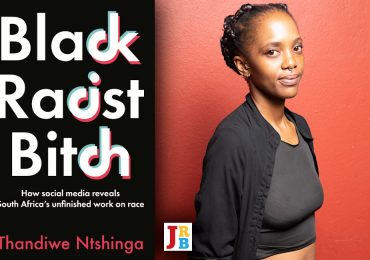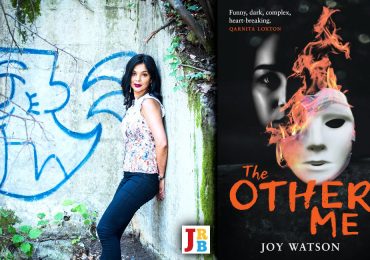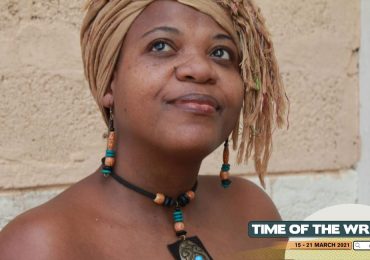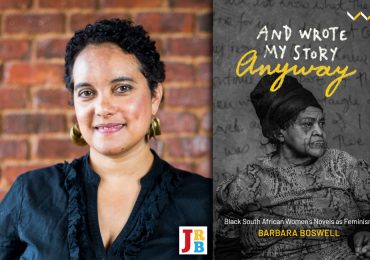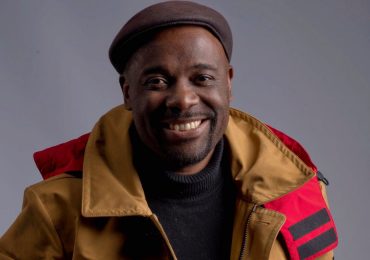The JRB presents an excerpt from I Write the Yawning Void: Selected Essays of Sindiwe Magona.
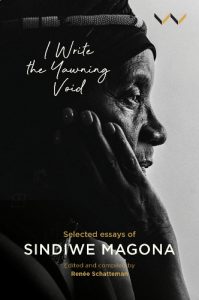
I Write the Yawning Void: Selected Essays of Sindiwe Magona
Sindiwe Magona, edited by Renée Schatteman
Wits University Press, 2023
Clawing At Stones
This essay was published in the 2001 collection The Spirit of Writing: Classic and Contemporary Essays Celebrating the Writing Life, edited by Mark Robert Waldman. In it, Sindiwe Magona describes how she became a reader and later a writer and outlines the personal and political challenges she faced as a black South African writer when attempting to record the extreme circumstances of apartheid.
Fear of Change
I have seen the thick welted scars
On people rudely plucked from hearth
And home. Bound hand and bleeding foot.
Kicked, punched, raped and ravaged
Every which way you dare to think.
Killed, in their millions and
Dumped on icy wave.And today, those unlucky enough to
Survive the gruesome plunder
Annoy the world by failing to be quite,
Quite human. By falling short of accepted
Standards of civilisation. Never mind that
On these people, was performed a
National Lobotomy, that has left them with
No tongue of their own.
I was in my thirties before I ever held a book written by a black woman in my hand; that was Maya Angelou’s I Know Why the Caged Bird Sings. Now I am in my fifties [Note: This essay was first published in 2001—Editor] and have read a few more such books, not as many as could be reasonably expected, given our numbers. However, for reasons too many, too painful, sickeningly familiar and inseparable as resin from bark in our lives, the vast majority of African women and women of African descent have yet to tell their stories.
I am no historian. Thus, in my case the telling cannot be in that mode. History’s dry exactitude kills the story: too many details simply disappear. My personal preference is music. If I could sing, I would have left songs that spoke of incredible beauty and unspeakable horror, for I have witnessed such things as make me want to shout about them from the mountaintops: the courage of women, forced to live whole lifetimes without their husbands. In my poetry, I call these women ‘gold widows’, as their men slaved hard in the gold mines of Johannesburg for gold that they and their women would never see, never wear. Meanwhile, alone in the damned villages, the women kept home, family and communities intact. They raised children, sowed and reaped fields, nursed the sick, and buried the dead—women dug graves and put corpses to rest. When, in desperation, they went to work in towns, domestic servants to white women, they became the invisible, recyclable hands that made things work, getting little for their pains.
I was there in 1950 when women marched, protesting the Pass Laws. They went to the Pass Office in Langa and, in an act of desperate courage, burned their pass books: the police, the white superintendent and his cronies watching, the women burned their passes.
I have also seen the most vile acts of man. Evil. Chief Albert Luthuli and Steve Biko are heroes who were killed because of their opposition to apartheid. Many others remain nameless skeletons hikers have since stumbled across on isolated mountains, or their corpses became manure on obscure Boer farms. We, the Africans against whom that evil was fully unleashed, have survived apartheid. But in fact the whole country has survived apartheid. The whole country. For none were (or could have been) left untainted by such evil. Yet the full story of apartheid has still to be told, and I want to be part of that telling. If only I could sing! Thousands would cram into the world’s most famous music halls and sacred stadiums, come to hear me sing of sorrow … and of joy.
Of humiliation … and of triumph. Of terrible loss … and of our redemption.
Alas, I cannot sing. But I have always enjoyed stories. Those told to me around the fire in the village of my birth, Gungululu, by my grandmothers. And, later, those that came to me via the written page.
As a child, I loved reading. Whenever I could lay my hands on a book, even the play I enjoyed, perhaps to excess, suffered. Books were prized possessions—I suppose precisely because of their scarcity. I come from peasant stock, and no one ever read me to sleep as a child. The only books my parents ever bought were those demanded by the school. Like most Africans of their generation in South Africa, they’d had the most rudimentary of educations. Besides, we were dirt poor. Books and book buying had no business in our life. However, I was very fortunate that Jola, a neighbour, worked as a domestic servant in a white home. There must have been children about my age in that white family I will never know. Often, she brought back books and comics from her ‘kitchen’, as these places of employment are called by the women who slave their lives away in them. Thus, I grew up reading good British comics as well as classic children’s books and it was with exceeding impatience that I waited for ‘Jola’s white people’ to be throwing out books.
Those books and the stories they brought me—that was magic and mystery all rolled into one. The stories were, at one and the same time, about strange faces, strange places and even stranger happenings, that’s true. But they were also about me. They gave me hope. This could also happen to me. I, also, could do this. When I’d finished reading the last book of a batch, I fell into a gloom. When would the next crop come? What stories would those books bring me? Where would those stories take place? Who would be doing what in them? The waiting was sheer torture. Therefore, mindful of the terrible inevitability of book endings and the long dry periods that threatened, when I might have absolutely nothing to read, I would read a book, especially the last of a batch, with artful slowness: stopping when I sensed that something exciting was about to happen, in eager anticipation; rereading whole chunks before proceeding after a pause.
And long before I came across enterprising teachers, I revelled in new words. When I met a new word for the first time, I immediately recognised it as a newcomer, a stranger whose acquaintance I had to make, an addition to my gem collection. With no dictionary to aid me (who had dictionaries in the African township then? who has them now?), I would attempt to decipher its meaning by examining its role, its function in the sentence, and, of course, within the realm of the story as a whole. Thereafter, I would try to use the new word myself. And do so as soon as opportunity presented itself. In class, I always came up with these clever expressions, phrases, or words no one else knew—to the delight of the teacher and the chagrin of my classmates, and my utter stupefaction that the other children failed to admire, applaud or feel the excitement I myself felt. I dare say mistakes were made in this manner of vocabulary building—but hey, I enjoyed the stories and marvelled as I whizzed through time and vast distances, well beyond the confines of Blouvlei, the sprawling tin-shack location where I was growing up, to places of splendour and grandeur, of the mystical and the magical, of excitement and adventure.
However, even then I recognised that, important as the story’s details and actions were, the more significant aspect, the power and magic, lay in the telling. Knowing nothing of story technique, I nevertheless fully understood there was a difference in how stories were told—thanks to those village evening sessions of my childhood where, around a fire, we children often heard the same story from different tellers. I grew up, therefore, aware that the same story sounded much more interesting (or less so), depending on who was telling it or, indeed, what mood, emphasis or nuance the same teller brought to its telling. It is from these fireside storytellers’ sessions that I learnt that the audience has to be engaged from the very start of the tale. Iintsomi, the Xhosa folktales of my early childhood, are begun with a short call and response format:
‘Kwathi ke kaloku ngantsomi!’ is what the teller opens with.
‘Chosi!’ respond the listeners. And throughout, the audience is actively involved, clapping or singing or chanting responses. Today, I read, and I enjoy the convenience that comes with this method of story sharing. But the thrill of the oral story is well-remembered—it still rushes through me.
The creative process has always been sacred to me, and although I grew up with no role models in the practice, I’ve always enjoyed writing. As a pupil, if the teacher was going to read an essay to the class, invariably, that essay would be mine. And I was not averse to the flattery such recognition implied. Later, as an elementary teacher, I found it very hard to grade essays. Grammar and spelling errors would go unmarked (and unpunished) while I marvelled at the creative genius of a young artist. The unknown worlds reading opens up to me are an endless source of awe and inspiration.
As late as 1990, I stumbled on the sad statistic that in South Africa, since African women had first began writing and publishing (in any genre, any language), only five women had accomplished that feat. Five! I write to change that—to bear witness, to tell those who will people this world long after I have gone what it was I saw, heard, experienced. They need to know who we were and what we were about. I believe future readers will appreciate hearing our perspective of things. Forced removals and the brutal scattering of the African community in South Africa killed the oral tradition, through which the history of the nation was preserved. However, the imperative of preservation not only stands but, doubtless, is even more urgent today, more urgent than ever before. Therefore, I write to leave footsteps.
Writing brings me healing. It is therapeutic. Writers generally write about what they know. And that knowledge is sometimes far from pleasant. But it is in writing about our disappointments, our failures, our losses, our defeats, our pain and suffering, that we discover the startling fact that we have survived all this and perhaps even thrived—despite the challenges such setbacks may have forced us to face.
Also, I am learning that writing is a long journey. Even in these times of modern travel, a journey can be full of surprises, unpredictable, and fraught with danger. Delays, handicaps, deceptive companions, and tantalising distractions abound. One’s mettle is sorely tested in this process.
~~~
- Sindiwe Magona is an internationally renowned South African writer who has received many awards and widespread recognition for her writing, her activism and humanitarian work. She has written novels, children’s books, short stories, poetry, biographies, autobiographies, essays, radio plays, and a screenplay. Magona was awarded the Order of iKhamanga by the President of the Republic of South Africa in 2011. She is Senior Research Fellow at the University of the Western Cape, South Africa.
- Renée Schatteman is Associate Professor at Georgia State University (USA) specialising in postcolonial literature. Among other books she is the co-author of Voices from the Continent, a three-volume curriculum guide to African literature and co-editor of Five Points: Special Issue on the Writing and Art of South Africa.
~~~
Publisher information
These essays bring to life many facets of Sindiwe Magona’s personal history, her deepest convictions, love for her country and belief in her ability to activate change. They are a meaningful supplement to her fictional works, while offering insightful responses to the conditions that inspired them.
Magona is a celebrated South African writer, storyteller and motivational speaker known mainly for her autobiographies, biographies, novels, short stories, poetry and children’s books. I Write the Yawning Void is a collection of essays that highlight her engagement with writing that span the transition from apartheid to the post-apartheid period and addresses themes such as HIV/Aids, language and culture, home and belonging.
Magona worked as a teacher, domestic worker and spent two decades working for the United Nations in the United States of America. She has received many awards for her fearless writing ‘truth to power’. Her written work is often informed by her lived experience of being a black woman resisting subjugation and poverty.
These essays bring to life many facets of Magona’s personal history as well as her deepest convictions, her love for her country and despair at the problems that continue to plague it, and her belief in her ability to activate change. They demonstrate Magona’s engaging storytelling and mastery of the essay form which serve as meaningful supplements to her fictional works, while simultaneously offering insightful responses to the conditions that inspired them.

